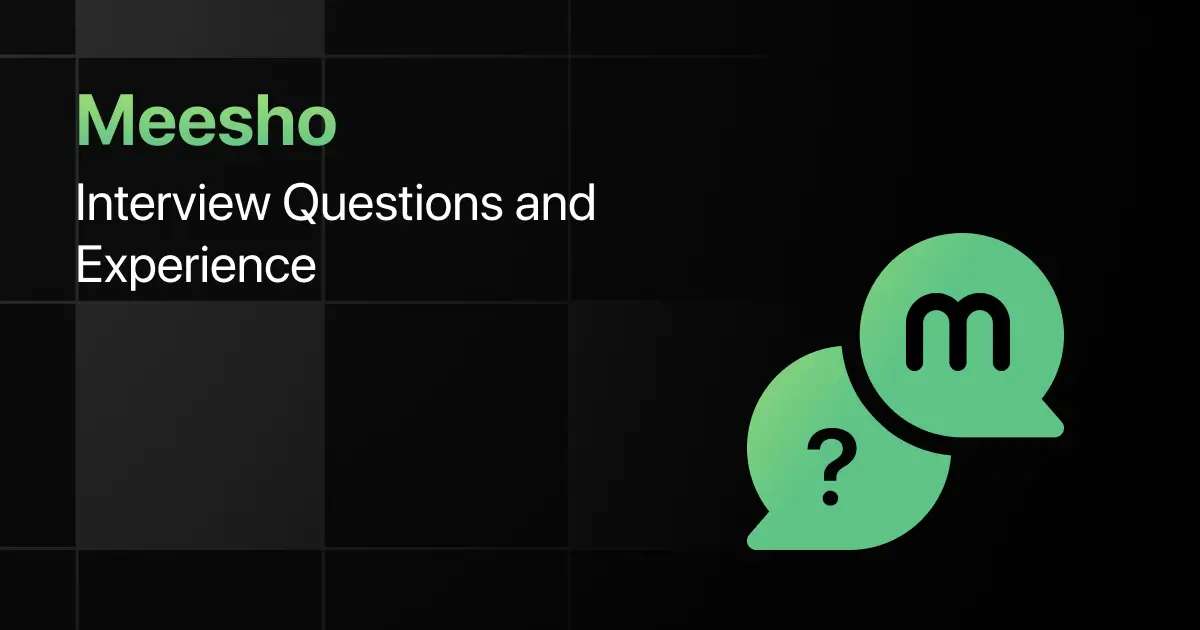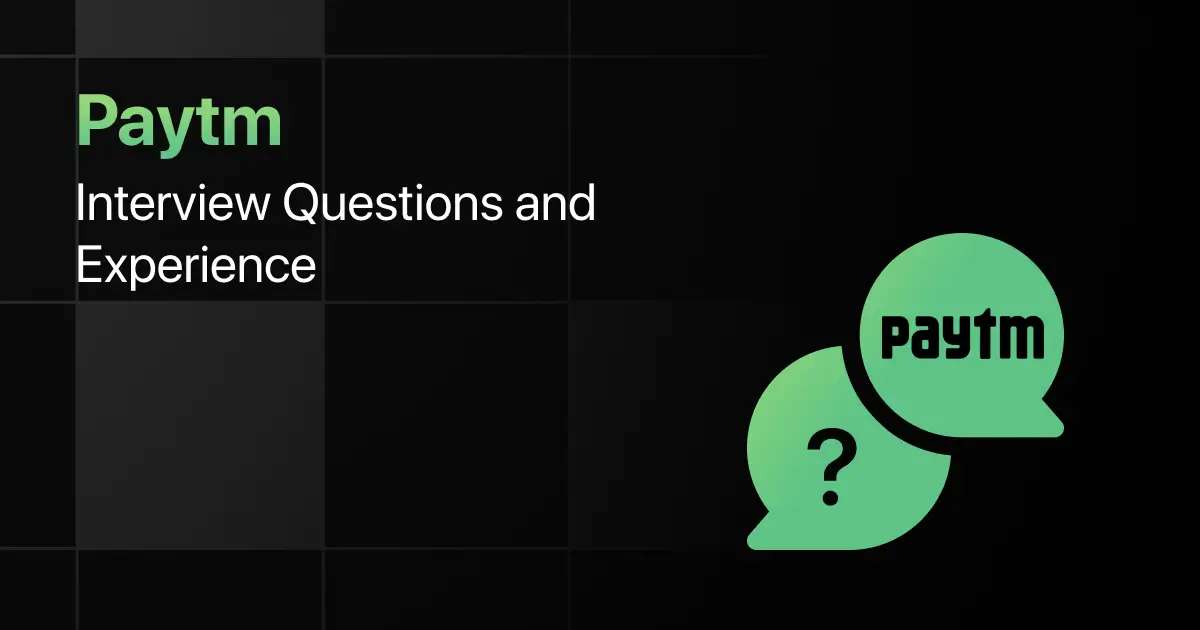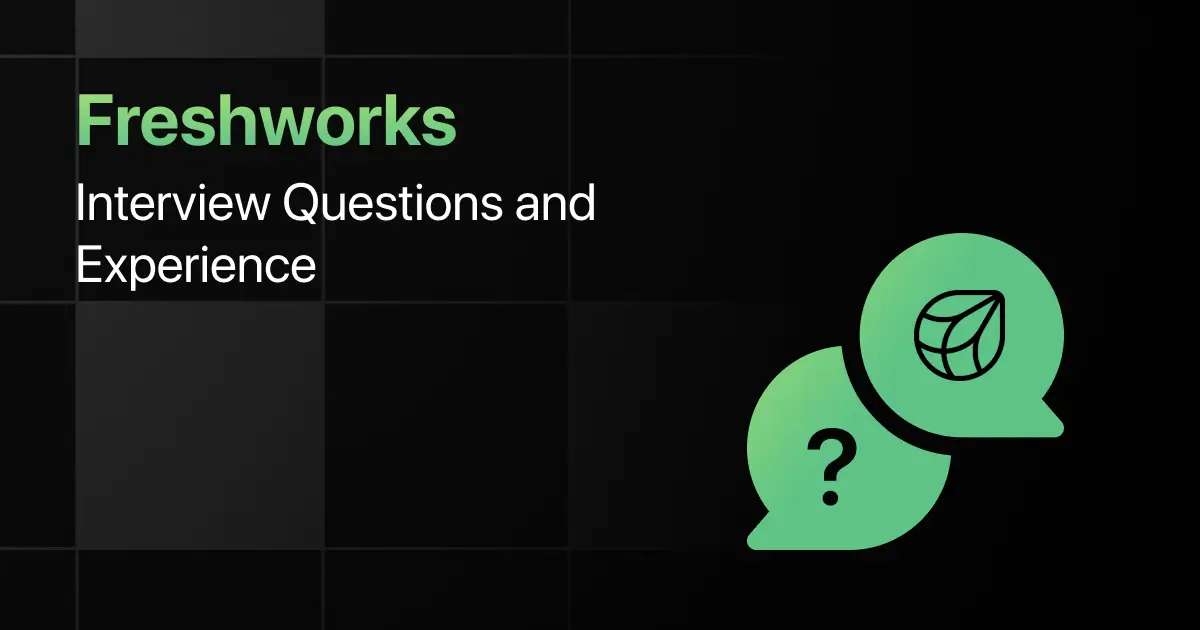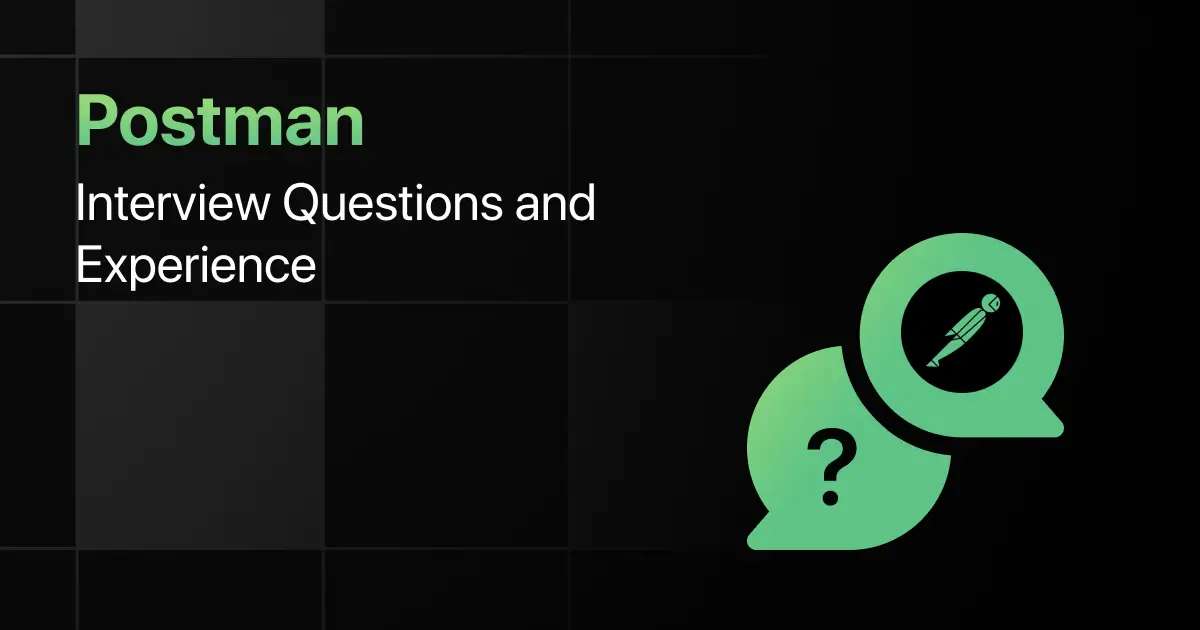Meesho Interview Questions and Experience

Have you ever wondered what it takes to crack an interview at Meesho, one of India’s fastest-growing e-commerce platforms?
Meesho is known for its startup-like culture, rapid innovation, and data-driven problem-solving approach. The interview process reflects this, focusing on technical expertise, analytical ability, and adaptability.
In this blog, we’ll explore Meesho’s hiring process, commonly asked interview questions, real candidate experiences, and preparation tips to help you succeed.
Meesho Hiring Process – Overview
Here’s a quick overview of Meesho’s hiring process:
| Category | Details |
|---|---|
| Eligibility | Open to both freshers and experienced candidates. Preferred degrees include Computer Science, Information Technology, Data Analytics, and related fields. |
| Rounds | Typically 4–5 rounds: Online Coding Test, Technical Interviews (2–3 rounds on DSA, problem-solving, and system design), followed by HR/Behavioral round. |
| Job Roles Offered | Software Development Engineer (SDE), Data Analyst, Data Scientist, Product Manager, Business Analyst. |
| Salary Range | Freshers: ₹8 – ₹15 LPA (AmbitionBox, Glassdoor). Experienced: ₹20 – ₹45 LPA depending on role and experience (AmbitionBox, Glassdoor). |
| Apply Link | Apply Now |
Top Meesho Interview Questions with Answers
Meesho’s interview process emphasizes technical problem-solving, role-specific expertise, and cultural fit. Candidates are tested on data structures, algorithms, system design, and business problem-solving relevant to e-commerce.
Behavioral rounds further assess adaptability, teamwork, and alignment with Meesho’s fast-paced culture.
1. Technical Questions
- What are the differences between Array and Linked List?
Arrays allow direct indexing with fixed size, while linked lists use dynamic nodes connected by pointers, making insertions and deletions easier. - Explain the concept of dynamic programming with an example.
Dynamic programming stores results of subproblems to avoid recomputation. For example, optimizing delivery routes by reusing previously calculated shortest paths. - What is the difference between SQL and NoSQL databases?
SQL databases are structured and relational; NoSQL databases handle unstructured, large-scale data with flexibility and high scalability. - What is caching, and how does Meesho benefit from it?
Caching stores frequently accessed data to reduce latency and improve response times during high-traffic sales events. - What are microservices, and why are they important?
Microservices split applications into independent modules, improving scalability, fault tolerance, and speed of deployment. - Explain CAP theorem in distributed systems.
It states that a distributed system can only provide two of the three guarantees: Consistency, Availability, and Partition Tolerance. - What is load balancing, and how does it work in e-commerce systems?
Load balancing distributes traffic across servers, ensuring high availability and preventing downtime during peak traffic. - What are ACID properties in databases?
Atomicity, Consistency, Isolation, and Durability ensure reliable database transactions in payment and order systems. - Explain BFS vs DFS with practical use cases.
BFS is useful for finding the shortest path in logistics, while DFS is effective for exploring deeper connections in graphs. - What is latency, and why is it important in e-commerce?
Latency is response delay; in e-commerce, high latency can cause abandoned carts and poor user experience. - What are indexes in databases, and why are they used?
Indexes speed up query execution by creating references to data, especially useful in large product catalogs. - How does Meesho handle scalability during mega sale events?
Through auto-scaling, caching, distributed databases, and traffic load balancing to support millions of concurrent users. - What is a Content Delivery Network (CDN), and why is it used?
A CDN delivers cached content from geographically closer servers to reduce latency and improve site performance. - What is the difference between synchronous and asynchronous communication in systems?
Synchronous waits for responses, while asynchronous allows processes to continue independently, improving efficiency in distributed systems. - What is the role of message queues in large-scale applications?
Message queues manage asynchronous communication between services, ensuring reliable processing of user requests at scale.
2. Role-Based Questions
For Freshers (SDE 1)
- Why do you want to join Meesho as a fresher?
Meesho provides the opportunity to solve large-scale technical challenges in e-commerce while learning from experts in a fast-paced environment. - Explain object-oriented programming principles.
Encapsulation, abstraction, inheritance, and polymorphism — essential for building modular and reusable software systems. - What do you know about Meesho’s business model?
Meesho enables small businesses and individuals to resell products online, focusing on affordability and scalability.
For Data Analyst
- What metrics would you use to measure seller performance on Meesho?
Number of sales, return rate, average order value, customer ratings, and repeat customers. - How would you clean and prepare data for analysis?
By handling missing values, removing duplicates, normalizing formats, and applying statistical methods for consistency. - What SQL query would you write to find top-selling categories?
By grouping sales data by category, summing revenue, and ordering results in descending order. - How would you visualize customer purchase behavior?
Using dashboards with heatmaps, cohort analysis, and trend lines to highlight buying patterns.
For Data Scientist / ML Engineer
- How would you build a recommendation engine for Meesho?
By combining collaborative filtering, content-based filtering, and deep learning for personalized product recommendations. - What steps would you take to prevent fraud in online transactions?
Use anomaly detection, machine learning classification, and pattern recognition to flag unusual activities. - What features would you include in a demand forecasting model?
Historical sales, discounts, seasonality, product categories, and external factors like festivals. - How would you evaluate a recommendation system?
Using precision, recall, F1-score, click-through rate (CTR), and conversion rate.
For Product / Business Roles (Product Manager, Business Analyst)
- How do you prioritize product features for Meesho?
By balancing user needs, business goals, and technical feasibility, using frameworks like RICE. - How do you ensure customer-first thinking in product decisions?
By integrating feedback from users, analyzing data, and ensuring products are simple, affordable, and scalable. - What business challenges do you think Meesho faces in scaling further?
Handling logistics at scale, ensuring seller trust, optimizing prices, and managing competition.
3. Behavioral Questions
- Tell me about a time you worked on a challenging project in a team.
I collaborated with peers to complete a project under a tight deadline by dividing tasks effectively and maintaining clear communication. - How do you handle disagreements with colleagues?
I listen carefully, present data to support my perspective, and seek a collaborative resolution that benefits the team. - Describe a situation where you had to adapt quickly to changes.
During an internship, requirements shifted suddenly, and I learned new tools to deliver results within the timeline. - How do you prioritize tasks when working under tight deadlines?
I break down tasks into milestones, focus on high-impact deliverables first, and update stakeholders regularly. - Give an example of when you took ownership of a project.
I identified inefficiencies in a project workflow, proposed improvements, and led the implementation, which improved performance. - How do you ensure clear communication with cross-functional teams?
By setting clear goals upfront, providing structured updates, and confirming alignment in follow-up discussions. - Why do you think cultural fit is important at Meesho?
Because Meesho thrives on ownership, innovation, and collaboration, requiring employees to align with these values. - What motivates you to work at Meesho?
The chance to solve impactful problems in India’s growing e-commerce space while working in a culture of innovation.
Meesho Interview Experiences
1. SDE Intern/Trainee role Interview Experience (Fresher)
Here’s the experience of Yash, who interviewed for the SDE Intern/Trainee role (Off-campus) at Meesho.
Candidate Background:
Yash was a final-year student from a Tier-3 college, with prior internship experience at Anuta Networks. Despite multiple rejections earlier, he kept applying off-campus and finally got shortlisted for Meesho.
Interview Process They Faced
- The process had 4 rounds:
- AI-based Screening (Nextlevel) – verbal problem-solving judged by AI.
- Online Coding Round (HackerRank) – 3 coding problems (LCS variation, deque problems) solved in 105 minutes.
- System Design Round (LLD) – inventory management system with OOPS-based implementation. Follow-up questions on DB schema and OOPS principles.
- Hiring Manager Round – resume discussion, prior experience, evolving technologies, and personal motivation.
Questions Asked
- AI-based reasoning questions with keyword-heavy responses.
- LCS and deque problems (DSA).
- Design inventory management with order processing features.
- OOPS follow-up: why use classes, benefits of modularity.
- Database questions: unique key constraint, indexing basics.
- HR discussion: views on technology trends, motivation to join Meesho.
Outcome & Difficulty Level:
Yash cleared all rounds and was selected. He described the LLD round as the toughest, but leveraging OOPS principles gave him an edge. His key learning: consistent practice, clear communication, and resume-based discussions are crucial at Meesho.
2. SDE role Interview Experience (Experienced)
Here’s the experience of D Mahamood Sameer, who interviewed for an SDE role (Referral-based) at Meesho.
Candidate Background:
Sameer had prior professional experience as an SDE and applied via referral after networking with senior employees on LinkedIn. He had a strong foundation in DSA, LLD, and CS fundamentals.
Interview Process They Faced
- The process had 3 stages:
- Online Assessment – 3 medium-to-hard coding questions, solved 2 fully and 1 partially.
- LLD Interview (1.5 hours) – implement a social media platform (posts, follow/unfollow, feed). Completed all functions including bonus ones, followed by DB queries.
- Managerial Interview (40 minutes) – project discussion, CS fundamentals (ACID, mutex, semaphores), and behavioral questions.
Questions Asked - OA: DSA questions involving arrays and strings.
- LLD: implement a scalable social media platform with 5+ functions.
- Database: schema design, SQL queries.
- CS Fundamentals: ACID properties, mutex, semaphores.
- Behavioral: “Tell me about an incident where you felt low and how you overcame it.”
Outcome & Difficulty Level:
Sameer was rejected after the managerial round, with no detailed feedback provided. He rated the LLD round as challenging but manageable, and emphasized continuous LLD practice, strong CS fundamentals, and persistent networking as crucial for Meesho.
Preparation Tips for Meesho Interviews
Preparing for Meesho interviews requires a mix of strong technical fundamentals, business understanding, and adaptability to startup-style problem-solving.
- Revise Fundamentals: Strengthen your core concepts in data structures, algorithms, databases, and operating systems, as these are commonly tested in technical rounds.
- Practice Problem-Solving: Regularly solve medium-to-hard coding problems on platforms like LeetCode, HackerRank, or PlacementPreparation.io to improve speed and efficiency.
- Understand System Design: For experienced roles, be ready to discuss system scalability, distributed systems, and how e-commerce platforms manage traffic spikes.
- Know Meesho’s Model: Research Meesho’s business, seller ecosystem, and customer-first approach, as role-specific questions often connect to the company’s mission.
- Prepare Behavioral Stories: Use the STAR method (Situation, Task, Action, Result) to structure answers around teamwork, ownership, adaptability, and leadership.
- Mock Interviews: Simulate real interview conditions with peers or mentors to refine your communication and build confidence under pressure.
Final Words
Meesho interviews are designed to test both technical expertise and alignment with its dynamic, startup-driven culture.
With solid preparation, clear communication, and a good understanding of Meesho’s business model, you can confidently navigate the process and secure your role.
Explore More for
- Amazon
- Salesforce
- Oracle
- Microsoft
- IBM
- Adobe
- Flipkart
- Apple
- Uber
- Zomato
- Swiggy
- Phonepe
- Zoho
- Postman
- Freshworks
- Paytm
- Darwinbox
FAQs
Meesho interview questions often cover data structures, algorithms, SQL, system design, problem-solving, product knowledge, and behavioral scenarios based on teamwork and ownership.
Meesho interview questions for freshers are moderately tough, focusing on problem-solving, coding fundamentals, logical reasoning, and adaptability to fast-paced startup challenges.
The Meesho interview process usually takes 2–4 weeks, depending on the role, number of interview rounds, and recruiter scheduling.
Candidates should focus on data structures, algorithms, SQL, system design basics, and analytical problem-solving skills relevant to large-scale e-commerce systems.
Common mistakes include unclear problem explanation, ignoring edge cases, weak knowledge of Meesho’s business model, and lack of structured answers in behavioral questions.
Meesho typically conducts 4–5 rounds, including online assessment, two or more technical interviews, and a final HR or behavioral discussion.
Yes, freshers face core problem-solving and coding, while experienced candidates are evaluated on advanced system design, scalability, business understanding, and leadership skills.
The best way to prepare for Meesho interviews is consistent coding practice, strong system design preparation, and using PlacementPreparation.io for tailored interview resources.
Related Posts


Paytm Interview Questions and Experience
Preparing for a Paytm interview requires a clear understanding of the company’s hiring process, the type of questions asked, and …
Warning: Undefined variable $post_id in /var/www/wordpress/wp-content/themes/placementpreparation/template-parts/popup-zenlite.php on line 1050








